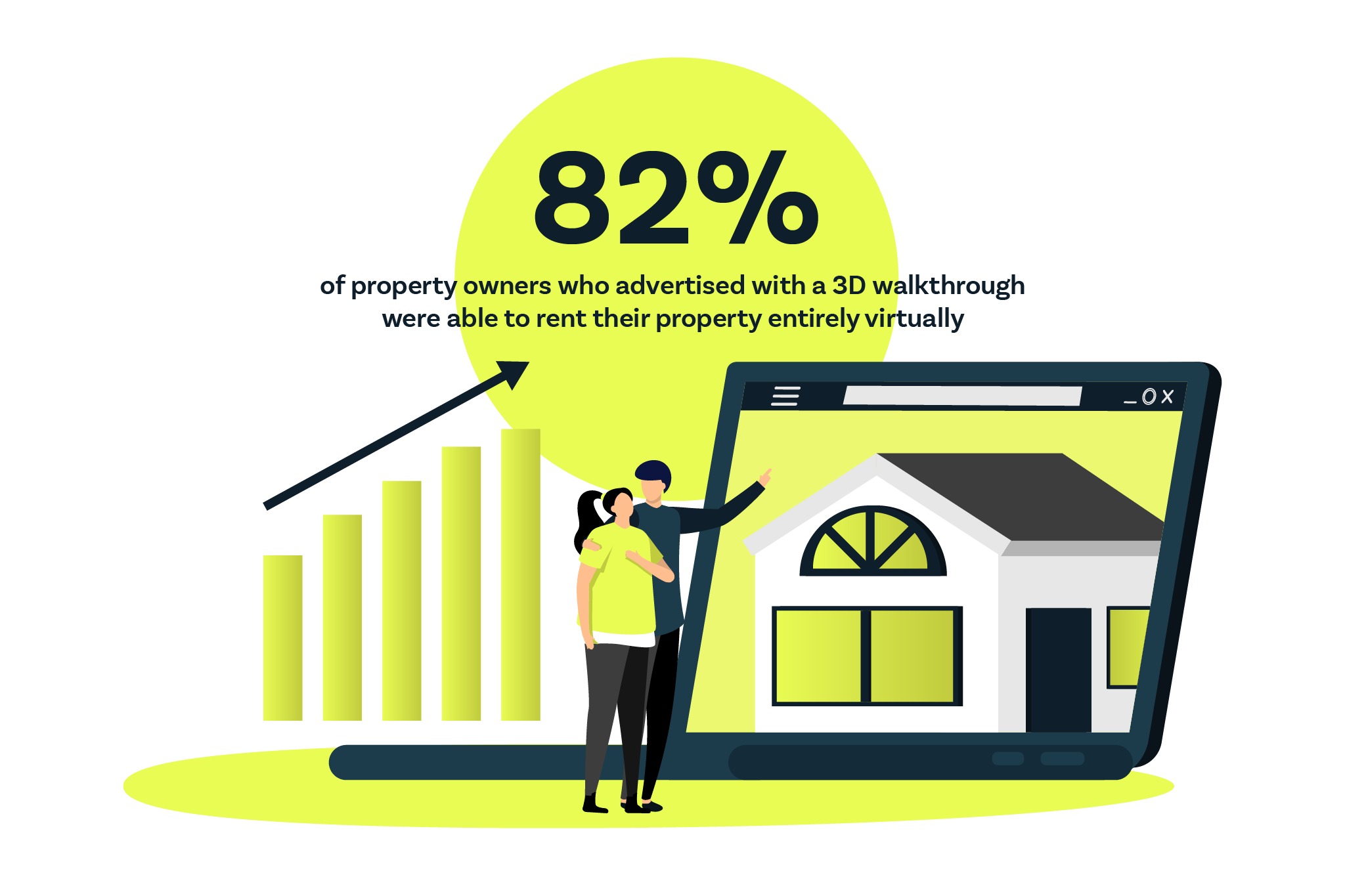For the real estate and property management sector that spent a majority of their pre-COVID time interacting with homebuyers, renters, and residents face-to-face, the pandemic has forced them to develop ways of operating in a contactless, digital world. This meant working hard to innovate and adapt to an exclusively virtual world, with the help of PropTech.
You’ve probably heard of the term – virtual leasing, especially amongst many multifamily circles and resources. It’s been gaining momentum as of late and for good reason! Leasing coordinators now consider virtual leasing an integral part of the lead generation and lease signing process.
By shifting workflow online and storing data in the cloud, you are positioning your property management company to provide faster, more reliable services for your tenants (current and future) while streamlining your operations. For on-site property managers, virtual leasing means saving time, money, and energy, since you no longer have to deal with things like long lines in the office or paperwork errors. Additionally, virtual leasing also allows property owners and managers to focus on doing what they love – and are essentially there for – growing the business!
Bookkeeping for real estate professionals and investors is an essential tool for everything from growing the business to understanding which business initiatives are or are not working. It can be time consuming, however, so it’s a great task to delegate to a virtual bookkeeping assistant. Let’s look at some bookkeeping basics and how outsourcing virtual assistant bookkeeping services can save you time and make you money.

According to a survey conducted by Zumper and Matterport, 82% of property owners who advertised with a 3D walkthrough were able to rent their property entirely virtually.
Despite attempts at a return to normalcy, consumers are still choosing to limit their daily face-to-face interactions whenever they can whilst most companies are providing employees with the option to choose between working from home or returning to the office.
If you can prepare your organization now, you’ll be ready for whatever comes next.
WHAT IS VIRTUAL LEASING?
So what exactly is virtual leasing? It is what it sounds like: renting a unit or property without ever having to visit the residence in person. The process involves a video chat with a leasing agent (either onsite or virtual) who can guide you through your potential new home. If you like it, you can sign your lease online and move in when you’re ready.
With social distancing somewhat still in effect, touring properties, in person, has become a thing of the past. And so, virtual leasing has risen to fill this need. While this phrase may be new to you, you’ve likely seen virtual leasing being put into practice.
The idea behind virtual leasing is to make it as easy as possible for renters to lease apartments. This can help with filling units faster, with less effort required by staff at the property. However, just because it’s growing in popularity doesn’t mean that some property management companies still don’t have any questions about the process.
While it’s not a new concept, virtual leasing has been revolutionized by the onset of COVID-19. For this reason, we’re seeing leasing offices across the country moving to a fully virtual model to maintain competitiveness by cutting costs and of course staying safe.
Even before COVID-19, virtual leasing was becoming more popular among property management companies nationwide. It’s a great way to reduce maintenance costs and drive efficiency for your business. Plus, by adopting a virtual model you can gain a competitive edge and appeal to modern renters.

HOW DOES VIRTUAL LEASING WORK?
It all starts with a tech platform that allows you to communicate effectively with potential residents and get everything done online. This can include showing an apartment virtually, accepting applications, collecting deposits, and signing a lease — all without needing to meet in person. The technology makes it possible, but it’s up to the people working behind the scenes to make it happen smoothly.
Virtual tours are also very convenient, especially if your clients live far away or have a busy schedule. Instead of either parties having to drive to multiple apartments or take several days off of work, you and your client can complete and go on several virtual tours in one day. If your client likes what they see, you can then go visit the apartment in person with your potential clients.
But is it really worth it?
WHY SHOULD YOU ADOPT VIRTUAL LEASING?
In today’s world, where many people are socially distancing, working from home, or simply prefer to not leave their homes as much as possible – virtual leasing is a perfect solution for this situation. The digital experience allows prospective residents to view available apartments without meeting face-to-face with leasing agents, tour the property using their own devices (like cell phones or tablets) and sign leases electronically once they’ve found their perfect place. Although the benefits of virtual leasing are endless, here are our top three reasons why we think every property management should adopt Virtual Leasing:

First, there’s the obvious: virtual leasing is a more cost-effective way to lease your properties. If you currently use a traditional leasing service, you know how expensive it can be. Adopting virtual leasing can help you save money by eliminating the need for an in-house leasing team and allowing you to lease your properties from anywhere with an Internet connection.
Second, it gives more control over your own schedule because there is no set schedule for when people need to arrive at work every day or how long they will be on call during off hours (or if they will answer calls at all). This allows property managers more flexibility when dealing with emergencies or unexpected events that arise during off hours or weekends (like a tenant who needs immediate assistance)
Third, it saves time by eliminating long commutes. You don’t have to commute to an office every day and waste time sitting in traffic or paying high parking fees at your destination. Instead, you can stay in touch with clients from anywhere in the world using Zoom or other online tools.
Here are four more reasons that virtual leasing is better than traditional paperwork-based leasing:
- You can process applications faster and more efficiently.
- You can increase quality control because every application is electronic.
- You can reduce errors because every document is electronic and can be easily edited as needed.
- You can provide a user-friendly experience for your tenants because everything is online and accessible from any device
Adopting a virtual leasing model can be beneficial for property managers and renters alike, with less paperwork, more efficiency, and additional flexibility.
It’s no secret that the modern business environment requires virtual leasing expertise. Whether you need to create a lease agreement or establish terms for temporary office space, a virtual leasing coordinator is essential.
WHAT IS A VIRTUAL ASSISTANT LEASING COORDINATOR?
A virtual assistant leasing coordinator (VA leasing coordinator) is a highly-skilled professional who works from a remote location that specializes in marketing, leasing, and management of your properties related to your leasing and sales process. They oversee everything related to a tenant’s lease, including:
- Renewals
- Transfers
- Retaining residents
- Lease violations.
They work closely with landlords, property managers, real estate agents, brokers, and other clients to develop strategies that will increase business opportunities while maintaining high occupancy levels at their properties.
Sounds familiar? That’s because they function exactly like any other in-house leasing coordinator would, only moving it to virtual.
This role is an integral part of ensuring the success of your leasing team and your business as a whole.
THE DIFFERENCE BETWEEN A LEASING COORDINATOR AND A VIRTUAL ONE?
The primary difference between the two is that a virtual leasing coordinator is able to complete all of these tasks from a remote location, while an onsite leasing coordinator’s role is confined to the physical community. With a VA leasing coordinator, you are not limited by geography or time zone constraints.
The duties of a VA leasing coordinator are similar to those of an on-site leasing coordinator however, there are some main differences to take note between a virtual assistant leasing coordinator and an on-site one which are:
- When you hire an in-house employee, you’re paying for more than the person’s time. You have to pay for taxes, benefits, and other expenses that add to the base salary. There are also costs associated with training, maintaining equipment and office space, and providing supplies. A VA leasing coordinator can help you save money in these areas.
- A VA leasing coordinator is likely to be more flexible with hours and may even work during non-business hours if needed (especially if located in a different time zone than the property manager).
- Virtual leasing coordinators are also a bit more nimble because they’re often generalists who can handle a variety of tasks as needed. Someone who works for an organization in a single role will have a narrower scope of knowledge and skills, so your needs may be better served by someone who can tackle numerous types of projects.
Virtual assistants have become the new secret weapon for many business owners and executives who want to live a more balanced lifestyle. This is because they free up time and energy so that business owners can focus on what’s important to them (i.e., growing their company, spending time with family and friends).

ROLES AND RESPONSIBILITIES OF A VA LEASING COORDINATOR
Virtual leasing coordinators are a great way to provide your prospective tenants with world-class service while freeing you up to focus on other aspects of your company.
Here are some tasks you can expect to be done when hiring this company:
Leasing Calls Being Answered 24/7
When we say that a virtual leasing coordinator answers all leasing calls, we mean it. There will be no missed or unanswered calls from prospective tenants, even if they call at 3 am. And unlike an automated answering system, which can feel impersonal and frustrating for the caller, the virtual leasing coordinator will provide each person who calls with a personalized experience.
Follow-Up Emails are not left unopened
The follow-up emails sent by a virtual leasing coordinator will include all of the information you need to convert the interested tenant into an actual leaseholder. For example, if someone inquires about one of your vacant apartments and wants to set up a time to see it in person, they’ll send an email that includes their availability. Then you can use this information to schedule the tour.
All Scheduling of Appointments are set
You’re probably thinking that scheduling appointments are something that you could do on your own because it doesn’t take long. And this is true! But when you consider how much other work you have to juggle, such as management and marketing, the time spent on scheduling appointments could be better spent on more important things.
Some of their key responsibilities include:
- Assists in the tenant screening process by verifying employment history/salary, obtaining credit reports/scores from financial institutions
- Preparing monthly lease abstracts
- Preparing documents for lease signings
- Inputting new and existing leases into the company’s database
- Updating listings
- Collecting rent payments
- Coordinating maintenance requests
- Create compelling advertisements that will attract potential clients
- Collecting and processing applications
- Managing and auditing rent roll data
- Overseeing the marketing and lead generation efforts of your properties
- Communicating with potential and current residents in response to inquiries about property availability, amenities, policies, and other items.
- Scheduling tours for potential renters to visit the property
- Coordinating and Completing move-in paperwork for new residents
- Providing information about the property and ensuring that any questions are answered in a timely manner
- And even Meet & Greet Clients (virtually of course. Safer that way!)
With a virtual leasing professional working around the clock, someone will always be available to answer calls and emails at any time—even outside normal business hours. Their goal is to ensure your prospects hear back quickly and have their questions answered so they can make quick decisions about renting one of your units or properties.
TIPS FOR GETTING STARTED WITH VIRTUAL LEASING
If you want to set up virtual leasing for your property management business, here are the steps to take:

Step 1: Hire a Virtual Leasing Coordinator
The virtual leasing model is a way of leasing an apartment that eliminates the need for an onsite leasing coordinator. Instead, the virtual leasing coordinator takes care of all the details and submits an application to you (property managers & owners) via email. You then review and approve or deny the application.
A virtual leasing coordinator manages all of your company’s leasing activities online. They answer questions about rental rates and availability in your listings, schedule showings, send rental applications and more.
This is an increasingly popular way to lease apartments especially for short-term leases (one year or less). While some property managers and owners prefer virtual leasing because it’s cheaper and easier than having a leasing agent on staff, others use it because they’re busy — a Virtual leasing coordinator allows you to concentrate on your business while letting someone else handle your leasing business.

Step 2: Set Up Your Virtual Leasing Software
The best way to do this is with a software program designed specifically for property managers and landlords. The software should be able to connect with popular listing sites like Zillow and Trulia and allow your virtual leasing coordinator to approve or decline rental applications online.
ManageCasa Virtual Management is a cloud-based application that provides users with all the features necessary to manage their leasing process online.
The platform accepts rental applications, requires deposits and rent payments, and manages the leasing process. It also manages digital leases, accounting and communications with tenants. It can be used with:
- Realync or Showing Hero for virtual tours
- Screen applicants with Certn
- and sign them up with Docusign.
They’re all popular tools that tenants will find convenient and helpful as they go through the leasing process.

Step 3: Start Accepting Rental Applications Online
Once you have all of these pieces in place, you can start accepting rental applications online! This will allow prospective tenants to apply directly through your website without having to go through an agent or other middleman. Your virtual leasing coordinator will handle all the backend processes for you!
Virtual leasing is a more efficient way to manage your properties, and it can help you scale your business. For a comprehensive list of tasks virtual assistants can assist with, see The Ultimate List Of Tasks to Outsource to Virtual Assistants.




